The Boss

 by Victoria Chang.
by Victoria Chang.
McSweeney’s Poetry Series, 2013,
64 pages, paper, $16,
ISBN: 978-1-938073-58-8.
Buy the Book
“Her boss is somewhere where is her boss” Victoria Chang asks, flouting grammar, in her new book, The Boss. This past summer, I found one Boss in Pavlov’s Music, in the small Ohio town of Cambridge where I grew up. In the back of Pavlov’s, there’s a selection of used vinyl, which is where I found The Boss — in a dusty copy of his Nebraska that I had a feeling had been sitting in Pavlov’s since the day I’d bought my first guitar almost 20 years ago. As Chang knows, one can find the boss many places — at work, at home, in an Edward Hopper painting, in one’s self, or in Pavlov’s Music in Cambridge, Ohio. Was Bruce Springsteen who Chang meant as her ubiquitous boss? Probably not. However, the spirit feels right. The boss is everywhere.
“The boss is not poetic writing about the boss is not poetic,” Chang says in her poem “The Boss Is Not Poetic,” and that’s for sure. To write about the boss we all have, yet want to be, is to expose our power-hungry, power-deficient, masochistic selves. Definitely not comforting, and The Boss doesn’t leave a reader with a warm, fuzzy, I’ve-been-poured-over-the-landscape-by-poetry feeling. It’s more like the constant fear of checking your email at work one too many times and now the boss is on to you, and you are screwed because the boss don’t play games. Haven’t we all been there? Maybe, but most of us don’t want to think about it so much.
Chang is careful about how she doles out The Boss. Almost every poem is exactly a page; they all meander along the left and right margins and none of the poems have a stitch of punctuation, unless you count capital letters as punctuation, and even those are pretty slim: “can they do that / can she do that yes she can in this land she can.” The result is a rhythmic, blurry and hypnotic syntax that keeps a reader going forward and backward to catch the phrasing. One could find this irritating, but for the most part, I found it pleasing. It wasn’t hard to do, and in fact, because of this syntax, I found myself chanting in my head my own riffs about the boss: the boss is going to the bathroom to bathe in his room the boss is still the boss in the bathroom. . . . I recommend any potential reader to try this. It’s very fun and you’ll be bossing yourself in no time.
So, who is the boss? Who indeed. One boss becomes many. I’m a boss, you a boss, boss, boss me, okay, boss? The poet is a boss with her kids, but is bossed by her boss and, most poignantly, the poet’s father, once a Big Boss in the Business World, suffers a stroke and “when I / ask him the name of his old boss / he says his own name.”
This is a sadly delusional, stroke-impaired moment, but isn’t it true that we all would like to think we’re our own boss? You’re not the boss of me, I’m my own boss! (Insert here: some Ayn Rand/Libertarian/laissez-faire capitalism bullshit.) Well, that’s nice to think, but Chang knows better. You have to serve somebody, and for the most part in this book, the boss is a no-fly zone, the one who sits in the back of the office and points the employees toward the edge of the roof and says: jump, or you’re fired.
And yet, “We are still in awe of the boss and / the law and all the dollars.” The boss is still, and always will be, the boss, whether you find him in Pavlov’s Music (The Boss forever!), or if she haunts you as Victoria Chang’s book did me, bossing me around for days before I resigned myself to the fact that “[t]oday is the boss the boss is today.” I have a review to finish; the boss wants it, and the sooner I accept that, the better. She the boss.
— Jefferson Navicky
The Messenger
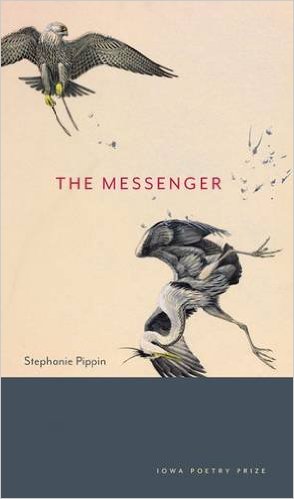
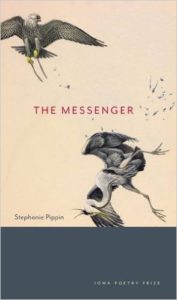 by Stephanie Pippin.
by Stephanie Pippin.
University of Iowa Press, 2013,
70 pages, paper, $18,
ISBN: 978 -1609381646.
Buy the Book
Birds of prey hold a place on the arm of poet Stephanie Pippin’s narrator and especially in her consciousness in her book, The Messenger. In this clarion collection, which was awarded the 2012 Iowa Poetry Prize, Pippin meditates on the liminal boundaries and relationships between the human and the wild.
The narrator’s connection to falcons, vultures, and ravens, as she helps to hatch, heals, tethers, and releases them, is a commingling of awe and need. She is consumed in awaiting their birth, in “Hatch”: “The hours from pip / to hatch, days / to trace the breaks, to see / the shell breached, are agony.” She feels dwarfed by the vastness and vitality of the wild, musing in “Red Pines” that “the egg // is its own law and more real than I, more / alive — a galaxy her wings obey / in everything they do.” She vibrates with awareness of the power dynamics between the winged creature and the human who holds her; in “Summer,” that creature is a messenger of both the wild world and Pippin’s own mortality:
As if to break my wrist,
or will,
she foots the glove —
makes me know
my bones.
Complex powers of life and death play out in “Propagation,” amid
the narrator’s efforts at stewardship, to keep a species alive: “We,
too, are in servitude / to vultures. They hiss / as we back from their nest.
/ They have a future / to protect. It is in my hand — / heavy,
alive, a warm / globe breathing in its shell.” And her ambivalence
finds yet more personal expression in “Raven”:
I am afraid
her trust is temporary, that the world
in which she
cannot live, cannot save herself,
is the world she will want
eventually. And I
the cage that keeps her from it.
Elsewhere, human intervention in the wild is murderous, as in the sequence of poems called “Lone Elk,” which addresses the systematic U.S. military extermination of Missouri elk populations in 1958. In “Live Weight,” a military participant observes: “We keep the heads, the ovaries, the stomachs. We make notes.” In the sequence’s last poem, the narrator addresses the sole surviving elk, acknowledging
the human urge to mythologize nature:
Your existence, inexplicable —
a hellish magnificence,
a message
from the dead. Or just
a lonely animal.
This projection of human meaning into the wild is a recurring notion in these poems. Pippin writes often of a visceral, bemusing empathy she feels for wild creatures, as in “Morning,” in which a songbird is loose in a room:
What I can’t understand is the hold
this has on me: that it will hit and fall
eventually, that after the bird is down, my
mind will confuse its pain with my own.
Elsewhere, nature offers now a spiritual balm, now a welcome respite from it. A stork’s head, suddenly glimpsed, is an “[a]nnunciatory gesture / pale as the angel’s sleight of hand.” But even as she’s moved to lyricize a divinity of wilderness, she is wise to her romanticism. As she remarks in “Iris,” “We’ve all mistaken windowed sky / for heaven.”
Pippin navigates these shifting ways of knowing with absolute clarity and a plain assurance that’s both humble and incantatory. There is power in the candor and ache of her voice, as well as, often, the sudden richness of earthy, fertile music worthy of Seamus Heaney, as in the terrain gorgeously described in “Riverlands”: “open, sogged with
August, / morels swelling like lungs / in the muck.” Her open-form lines and often striking enjambment draw us to slow, hang, and turn amid layers of meaning and feeling. After gutting a doe, Pippin muses,
I find her hollow
shape is the form I want
to sink into.
Life and death are inextricable in these poems, and Pippin mourns
the eventual loss of the bird she once tethered and half held, half
found herself held by. Despite the almost maternal ache of her
grief, she ultimately embraces joy and gratitude for the life she’s
momentarily clutched so close, as in the lovely, airy “Pinion”:
Now that I’ve lived
to see you
vanish, I see
what you mean
is the same
as what you meant
living:
my windfall,
my luck entirely.
Pippin ends the volume with promise and continuance in “Candling Eggs,” in which she embraces the brief, fragile, ambiguous bond of her human body and a wild creature-to-be:
It comes
to this —
warm egg, my palm
made momentary cradle.
Her voice, hailing from such primal borderlands of beings, is itself that of a messenger.
— Megan Grumbling
Translations from the Flesh
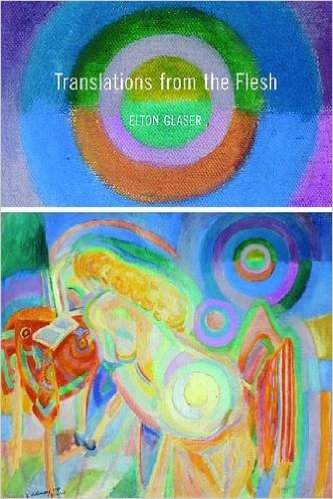
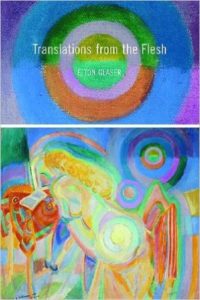 by Elton Glaser,
by Elton Glaser,
University of Pittsburgh Press, 2013,
$15.95, 85 pages, paper,
ISBN: 978-0-8229-6234-2.
Buy the Book
The first time I stumbled across Elton Glaser was in the Fall 2011 edition of the New Ohio Review. I was hooked immediately by the fervent and didactic tone of “Solo in the Skeleton Key,” a voice that spoke with seemingly ageless experience and authority on the subject of love. “Translations from the Flesh” is Glaser’s seventh full-length book of poetry, and in it I found a poet completing his mastery of wit and seduction. Glaser speaks with a voice that is both pondering and affirmed by its purpose, alternately resigned and vigorous. Surprising and intricately paradoxical, his poems express vivid and ecstatic prophecies and musings that develop the concepts of love and transcendence.
A longing for both metaphysical fulfillment and erotic satisfaction pervades many poems, and none can summarize it better than a passage from “Unrequited Dialogue by Moonlight”:
I’d like a few answers that would
Make the missionaries trade their Bibles
For a jukebox and a sharkskin suit; that would
Convince me to walk this earth
In the only serious position, on all fours,
Like a hound sniffing out the backside of paradise.
Glaser crawls through the dirt on all fours in search of these answers, proselytizing as he goes. The voices of his poems roam through risqué subjects with cheeky expressions and illustrative analogies. Glaser speaks in a contemporary voice that uses luscious language without becoming verbose: each poem is filled with hooks that will catch in the mind. “A Contrecoeur” is a keen example of the natural and colloquial prose that makes this collection so memorable:
Sometimes I feel afraid for it, my heart
like a mouse in a windmill,
in an avalanche of grain.
While many of Glaser’s inconspicuous metaphors and analogies are playful, they often belie the yearning and urgency that constitutes much of this collection. The sultry “95% of Love is Half of What You Want” spins the reader onto the dance floor with sexual kinesis, and “Pitching Woo” speaks with confident assertions but the nagging precognition of loss. As I delved deeper, I found myself wondering what else could inspire these stormy lines other than a private life filled with disaster, and additionally, what else could be more provocative and engaging?
The title of the book serves aptly to introduce the recurrent association of the intellectual and the physical spheres. No poem more aptly epitomizes the title as well as “Solo in the Skeleton Key,” a raw and evocative ode to passion and the damage of time:
Love’s no trick of ecstasy, no lightening strike in the mind.
Each new child
Struggles out, bloody and stunned, one more last chance to
get it right.
For the reader seeking ideas of universal order in poetry, the gravity of this stanza is especially poignant. Glaser’s thesis on the human condition is a tribute to the labors of his lines; throughout the book, he translates from “this stony ground” a host of reflections that relate the struggle of the heart as “winter withers the stalks” of youthful deviance, ardor, and enthusiasm. I found great beauty in his tenacity in the face of the inevitable.
Eventually, Glaser’s roaming quest leads him into dark places. Underneath the masking stoicism of “Downloading the Meltdown” and “Not Dead but Deading,” which asserts, “There’s no unified theory of the heart, only fiction and flesh,” there lies a plaintive soul at odds with reality, resurfacing again in “Coupling on the Edge of Entropy” where the speaker exclaims, “What’s one man against the laws of a raucous universe?” In a book full of intrigue, Glaser eloquently frames the questions that haunt the pensive mind so that the answers are unnecessary: pondering the questions is itself enough.
— Andre Demers
As Long as Trees Last
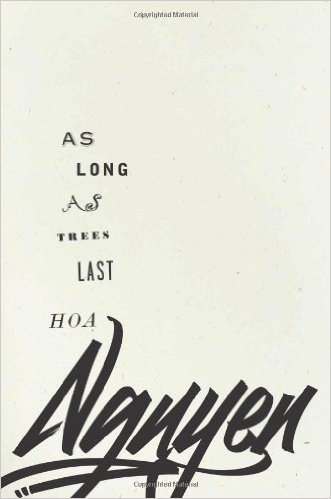
 by Hoa Nguyen,
by Hoa Nguyen,
Wave Books, 2012,
69 pages, paper,
ISBN: 978-1933517612.
Buy the Book
Next time I’ll crack
more pepper also knead
more cheese in there
(insert an involuntary
psychic activity)
— “Bread”
In her third full-length collection, As Long as Trees Last, Hoa Nguyen is still challenging expectations of the lyric voice in poetry. This last phrase, offset as parenthetical, provides a distinction between the initial voice and the aside, a kind of internal monologue or stage direction, adding another layer and complicating the speaker(s) therein.
In these poems, Nguyen prefers multiplicity over a single authority, the demotic over the omniscient, and incorporates an uncensored world, clunky and inelegant as it can be. With an unorthodox syntax, Nguyen creates her own space. Often, she arranges a poem on the page as a beautifully set pillar, using minute and irregular spacing. In her poem “Unused Baby” she writes:
I tried to glue the ripped
paper back to the religious
art but it doesn’t work
Making a mess of it
Here, the mystery is more provoking and perhaps more central than any answer. Her sound at times is dreamy, timeless, while she still appropriates today’s diction: phrases such as “asspatched jeans,” “SpongeBob SquarePants Band-Aid” and “Charlie Sheen” appear in this collection. The zip and immediacy of this public
and often commercial language adds levity to her serious, theoretical meditations. In the poem “Stimulus Drive
Bulge,” Nguyen writes:
2001: Three point three trillion
2009: Seventeen point three trillion
“It’s simpler now to retire —
you just die in the office”
This last phrase closing the poem is offset as a quotation, making it, perhaps, a phrase overheard, one that cannot be unheard or forgotten. This quote’s placement, separate from but following corporate language, is striking; it addresses the reader directly and with resonance.
Nguyen, engaged with the world, is interested in poetry of warning. Her ecopoetics begin with language; though she writes of contemporary events and the concerns of a consumer society, her style challenges ownership and authorship, and makes the reader question who, exactly, is the voice? In the poem “Intimate,” she writes:
(intimate) I know where the meat comes form
my blah blah boring day blah
Blunt my appetites for today
In these poems, questions and thoughts self-interrupt. What’s omitted, what’s confusing, and what remains silent are just as important as what is present. Nguyen’s poetry is not closed, nor does it explain itself away and thus lose itself to meaning. At times, the poem is in the leap between stanzas, as in “The Soul They Say”:
The soul they say has no
gender
Unemployment
estimated at 20%
This leap is another way to make meaning. Charles Olson wrote in his essay “Projective Verse,” 63 years ago, of poetry’s capacity for invention, and of poetic forms’ openness and availability to the writer. In his words: “There it is, brothers, sitting there, for USE.” Here, form is indeed explored in experimental ways. In “Words You Should Know,” the reader is presented with what seems an erasure of an abecedarian poem. The poem “Us” (or “US”) is a palindrome. The poem “I’m Stuck” reads as notes from a to-do list:
What it means to be
out of work:
Write a crime novel
Work at a food bank
In As Long as Trees Last, these short poems manage to be multi-tonal, commanding, strange, full of verve. They force the reader to listen, to question, and to pay attention.
— Lauren Hilger


